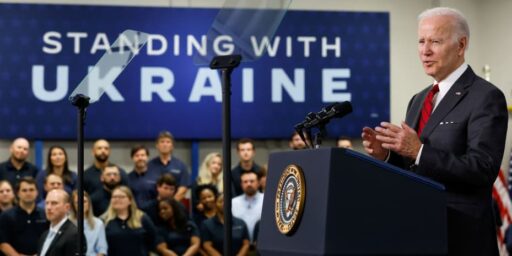Why Only in Ukraine?
Charles Krauthammer asks the title question, “Why Only in Ukraine?” in his WaPo column today.
There has been general back-patting in the West about renewed European-American comity during the Ukrainian crisis. Both the United States and Europe have been doing exactly the right thing: rejecting a fraudulent election run by a corrupt oligarchy and insisting on a new vote. This gives us an opportunity to ostentatiously come together with Europe. Considering our recent disagreements, that is a good thing. But before we get carried away with this era of good feeling, let us note the reason for this sudden unity.
This is about Russia first, democracy only second. This Ukrainian episode is a brief, almost nostalgic throwback to the Cold War. Russia is trying to hang on to the last remnants of its empire. The West wants to finish the job begun with the fall of the Berlin Wall and continue Europe’s march to the east.
*** That is why this comity between the United States and Europe is only temporary. The Europeans essentially believe, to paraphrase Stalin, in democracy on one continent. As for democracy elsewhere, they really could not care less. They pretend, however, that this opposition to America’s odd belief in spreading democracy universally is based not on indifference but on superior wisdom — the world-weary sagacity of a more ancient and experienced civilization that knows that one cannot bring liberty to barbarians. Meaning, Arabs. And Muslims. And Iraqis.
*** If you had said 20 years ago that Ukraine would today be on the threshold of joining a democratic Europe, you, too, would have been called a hopeless utopian. Yes, Iraq has no democratic tradition and deep ethnic divisions. But Ukrainian democracy is all of 13 years old, much of it dominated by a corrupt, authoritarian regime with close ties to an even more corrupt and authoritarian Russia. And with a civilizational split right down the middle, Ukraine has profound, and potentially catastrophic, divisions.
So let us all join hands in praise of the young people braving the cold in the streets of Kiev. But then tell me why there is such silence about the Iraqis, young and old, braving bullets and bombs, organizing electorate lists and negotiating coalitions even as we speak. Where is it written: Only in Ukraine?
A reasonable question, to be sure. Krauthammer’s explanation is dead on. One only has to recall the 1990s, when the Europeans were all for action to stop rump Yugoslavia from imposing its will on breakaway republics of Bosnia, Kosovo, and Slovenia and yet had decidedly little appetite for doing much about much more tragic situations in Somalia, Rwanda, Mozambique, Haiti, and other places populated by those of darker hue.
To be fair, though, this is a question of sphere of influence as much as it is about Eurocentrism. Problems in Eastern Europe have a much more profound effect–whether in terms of trade, refugee flow, or terrorist spillover–on Western Europe than do events in Africa, the Middle East, or Latin America. Only the United States truly has global interests, and even we are more likely to take bold action to protect our interests in Europe than anywhere else, unless a threat to our oil supply is at stake. Indeed, the neo-conservative motivation of the second Iraq War is an outlier in the history of our foreign policy. Promotion of democracy is something that we’ve typically done through diplomatic and economic suasion. We’ve seldom gone to war with that as the primary intent.





